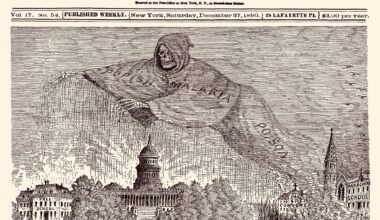The Scopes Trial of July 1925 in Dayton, Tennessee, is of great historical interest in the history of science and religion. It was a political and cultural flashpoint. The plays, films, songs, and books inspired by it are largely in agreement about the events and players of that great, unnecessary drama of fundamentalism and political expediency. The image of hundreds of people waving crosses in the area outside the court proceedings and singing ‘Gimme that old-time religion’ will live long in the historical memory of the political history of the theory of evolution.
However, my argument here is that the ghost of Scopes lives on. Nothing was really gained from that shallow initial victory. This is not a hard case to prove.
The late great Michael Ruse has perhaps summarised the struggle between creationism and evolution in the United States better than anybody. Ruse, who was professor emeritus of philosophy at Florida State University until his death last winter, was himself a witness for the side of science in the 1981 court case McLean v. Arkansas Board of Education on the teaching of creationism in schools across Arkansas.
In his 2005 book The Evolution–Creation Struggle, Ruse noted that Scopes was not only inevitable but merely the first fire across the bows of modern biology by the fundamentalist South. He is also explicit that this has never been merely a case of science versus religion, which he sees as a lazy narrative. Rather, the challenge of creationism and ‘intelligent design’ (ID) is a political one and a constitutional issue, a challenge of governance, values, and ethics, and a historical challenge, too, particularly in the Bible Belt.
Scopes triggered the invention of a whole movement that had never existed before: so-called ‘Creation Science’, which is now a multi-billion-dollar industry all of its own. Henry Morris is notable amongst its founders in seeking to find scientific proof of young-earth creationism. There is a straight line from Morris to the likes of Ken Ham, Kent Hovind, and now the modern ID movement. The same script is always presented: ‘Modern science can’t account for these questions or problems in science (particularly evolutionary science). Therefore, God had to do it.’ This god-of-the-gaps thinking is deeply out of touch with modern research. As the twentieth century developed, these movements became very large, and wealthy Christians fearful for their children’s salvation poured money into them.
The court cases continued. As well as McLean v. Arkansas, there have been fourteen other court cases (excluding Scopes) over the teaching of creationism in school science classes. All ended the same way, with rulings that creationism and ID are not science but religion, and that the teaching of religion in science classes is unconstitutional. This has never served as a deterrent. The creationists just reload and then try again. The famous 2005 Kitzmiller v. Dover trial was overseen by a George W. Bush-appointed judge. This did not matter, however. The religious motivation of the ID crowd was so clear that there was never any doubt as to the outcome of the trial.
The ID movement has been accurately described as ‘creationism in a cheap tuxedo’, but they have long tried immensely hard to tick every box of demarcation criteria and set themselves apart from the cruder, more obviously religious creationists. They have hired research labs and done their utmost to get articles published in peer-reviewed journals and have even started their own journal, Biocomplexity. However, this is easily seen for the façade it is, and to anyone looking carefully, it is obvious that no new research has been produced by this self-declared branch of science. The ghost of Scopes remains despite each attempt at exorcism, even when the exorcism is a public relations exercise conducted by creationism’s more polished cousins.
Last year, a brand-new ID centre was opened in Cambridge, and, based on my personal knowledge and conversations with Cambridge scientists, it turns out that several prominent young-earth creationists are jumping on the ID bandwagon and attempting to establish new centres in the UK (including in Cambridge again, no doubt in an attempt at stealing some prestige of being ‘Cambridge-based’).
As long as the narrative against evolution remains in religious circles, there will be a market for rejecting science in favour of fundamentalism. It is not just Christian creationists, either. Other religions have their own forms of this pseudoscience. For example, Richard Dawkins has recently spent time in New Zealand addressing the incursion of non-scientific indigenous ‘ways of knowing’ into the high school science curriculum.
I fear, however, that the creationism/ID lobby is even more insidious than ever. As homeschooling grows in the United States, so does a proliferation of creationist homeschool literature, a recent example of which includes a flat earth ‘Biblical cosmology’ which incorporates a plethora of conspiratorial thinking drawn from all the latest trends. Painted as a battle of two world systems, science is firmly on the side of Satan. This is no different from the crowds waving crosses and singing for ‘old-time religion’ in 1925.

The creationist/ID lobby can also have the effect of rendering a PhD meaningless. Two church leaders recently shared with me stories of meeting other church leaders who were creationist advocates. These latter possessed doctorates in cosmology, forensic science, and astronomy, and they swore blindly that science clearly and unequivocally points to both a young earth and the falsehood of evolution. Despite their blatant lie, this is not at all uncommon.
There is now quite a market for fundamentalists to get a science degree or even a doctorate with the sole purpose of advocating for creationism. They will never publish anything, get a scientific job, or contribute to their field. Rather, they qualify in science simply to undermine it. Fundamentalism can sometimes be best understood as a dishonest career move, giving jobs for life to the unscrupulous as well as the true believers.
A century after Clarence Darrow and William Jennings Bryan went toe-to-toe in a Tennessee courtroom over the teaching of evolutionary science, the ghost of Scopes has not disappeared. Rather, it lives on, in new forms and with new friends. That is the sad truth.
Related reading
Why Design Arguments Necessarily Fail, by Samuel McKee
The future of biology, science vs. religion, and ‘ideological pollution’ in science: Interview with Jerry Coyne, by Samuel McKee
Reality always wins: the perils of ideological science, by Samuel McKee
A farewell to Dawkins? by Samuel McKee
Bringing back the dialectic: interview with Stephen ‘Rationality Rules’ Woodford, by Samuel McKee








1 comment
Thank you for this sharp, illuminating reflection on the enduring legacy of the Scopes Trial. Your exploration of how creationism and intelligent design continue to evolve—often cloaked in pseudoscientific respectability—is both sobering and thought-provoking. A powerful reminder that the defense of science requires not only evidence, but also constant vigilance
Regard Unissula
Your email address will not be published. Comments are subject to our Community Guidelines. Required fields are marked *
Donate